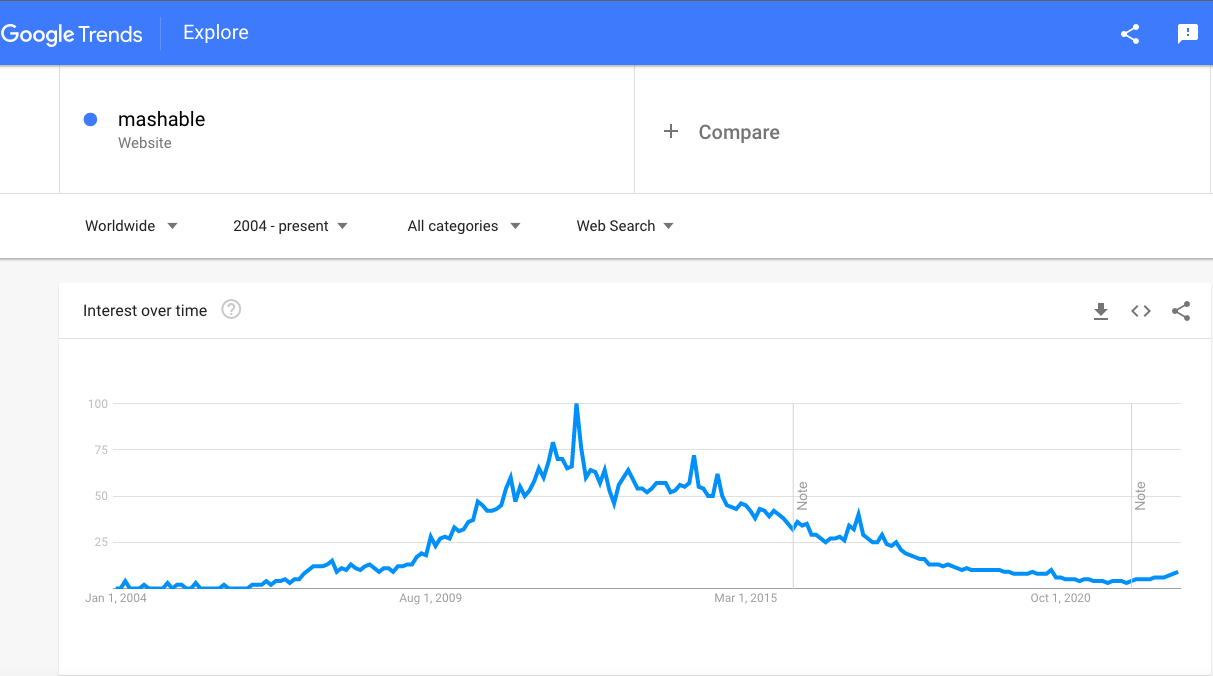
What Can We Learn From The Success, Failure And Rise Again Of Mashable?
According to the job site ZIPPIA in Nov, 2022, Mashable have an annual revenue of US$ 16 million per year. It has 120 employees with revenue per employee at US$ 133,000. This amount includes salaries and bonuses. So, Mashable is actually doing well today.
These salary figures are not bad considering that according to a company review website, Glassdoor, the average Mashable reporter earns US$ 72,546 per year while a video producer earns US$ 77,751 a year.
But these rosy employment figures from Mashable hides the fact that it is way below its peak in the 2010s to the 2015s when together with other new media online companies like BuzzFeed and Vox were going toe to toe with the more established US media companies.
As the chart below would indicate, today, they are nowhere near their peak which proves that they were a great success once and later became a great failure later. But what is interesting is that they are getting slowly more popular again.

HOW DID MASHABLE CAME ABOUT?
 Perhaps the most interesting story aspiring content creators can learn from Mashable is the fact that it started as a one person business. To be more precise, Mashable was started by a teenager right on his own bedroom on his parent’s house.
Perhaps the most interesting story aspiring content creators can learn from Mashable is the fact that it started as a one person business. To be more precise, Mashable was started by a teenager right on his own bedroom on his parent’s house.
It’s founder, Peter Cashmore was then a 19 year-old teen in Aberdeen, Scotland in 2005 when he started his UK-based technology blog. He would work on his blog until the wee hours of the morning while keeping his blogging activities a secret to his parents.
He avoided going through the path most young people take which was to go to school and after graduating become a long-time employee of a company. Peter knew what he wanted to do with his life even at an early stage.
Peter is living proof that anyone, even a one person team can start a successful online business that can grow to a multimillion online business. His business is also proof that blogging is not a dead-end business but could be a very profitable one.
Peter is also proof that you don’t need a higher education to improve your financial future. In fact, there are even many blue collar workers who are out-earning white collar workers. In the end, it’s the demand for your skill or product that determines what you earn and not your degree.
IS OBSESSION WITH NUMBERS IMPORTANT?
 According to Peter, much of his success had to do with being obsessed with numbers and statistics on his site. This is all so true today in the world of blogging. When blogging first started, it was almost always about lifestyle blogging.
According to Peter, much of his success had to do with being obsessed with numbers and statistics on his site. This is all so true today in the world of blogging. When blogging first started, it was almost always about lifestyle blogging.
Famous bloggers back then would blog about the details of their everyday life. They would tell their readers what they did and eat for breakfast for example and the other mundane things people do on a daily basis.
But as most blogging coaches of today would tell you, this type of blogging is dying and is being replaced by informational blogging. This means that readers today are interested in bloggers and blogs that they can learn something from.
And as the competition heats up in the blogging industry, more and more bloggers are including statistical figures and numerical facts in their blogs which aspiring bloggers must also add to their blogs if they want to compete.
SUCCESS DIDN’T COME EARLY AND HARDWORK
 If you would look at the Google Trends chart above, you would notice that it took almost two year for Mashable to start taking off. Then it plateaued for a year before finally beginning its steep ascent to fame.
If you would look at the Google Trends chart above, you would notice that it took almost two year for Mashable to start taking off. Then it plateaued for a year before finally beginning its steep ascent to fame.
And this is where bloggers and other online content creators generally fail. As most business coaches would tell you, most business started eventually fail after one to two years. The third year would usually indicate if the business would thrive or not.
Yet, many aspiring online content creators don’t study this growth chart or information. This is because many aspiring online content creators are bombarded with website articles and YouTube videos about newbie online content creators striking it big at an early stage.
These same website articles and YouTube videos often fail to warn their readers and viewers that for every one online creator that succeeds there are thousands and even several thousands that fail.
If you’re an aspiring content creator, you should be ready to put in a lot of work for years to come if you ever want to succeed. Peter himself confessed with staying up until 3 to 4 in the morning just to work on Mashable content.
IS ESTABLISHING A PERSONAL BRAND IMPORTANT?
 In 2012, many considered that Mashable was one of the most viable internet companies of that day. So much so that the US media giant, CNN, even threatened a hostile takeover of the company. This was how much media companies feared Mashable’s success then.
In 2012, many considered that Mashable was one of the most viable internet companies of that day. So much so that the US media giant, CNN, even threatened a hostile takeover of the company. This was how much media companies feared Mashable’s success then.
For example, in 2009, Mashable began to attract around 5 million visitors a month. At the same time, Peter’s popularity also soared. This is understandable as people love wonder kids and Peter was only then in his mid-twenties and arguably handsome.
And his personal fame might have added considerably to the fame of Mashable. This is a lesson that should be learned by not only online content creators but many aspiring businessperson. Today, personal brands go hand in hand with their companies.
Apple had then Steve Jobs which propelled Apple to stratospheric fame and fortune. Tesla has Elon Musk, MicroSoft has Steve Jobs… and the list goes on and on.
Business owners and founders should consider that in the world of social media, companies don’t only sell their products and business but also sell the character of their owners. The more charismatic an owner is, the more is the chance of a company to make more sales.
WHY DID MASHABLE FAIL IN THE LATER YEARS?
 Those that studied Mashable’s meteoric success and eventual downfall had reasoned that there are two main reasons why it fell: Firstly, it pivoted into a general content site directly taking on news media giants like CNN; and secondly, it got drunk with seed funding money.
Those that studied Mashable’s meteoric success and eventual downfall had reasoned that there are two main reasons why it fell: Firstly, it pivoted into a general content site directly taking on news media giants like CNN; and secondly, it got drunk with seed funding money.
Though it is highly debatable if Mashable’s pivot to producing general news content proved to be its undoing: Mashable tremendously became more popular in the early days it generated general news content but later on their viewership numbers tanked.
But what is clear is that as soon as Mashable gained funding from institutional investors, it didn’t significantly improve their company but instead they started burning out cash funds fast.
The stories of their extravagance is known: they moved to swankier offices and offered employee perks that only giant companies like Google offered. They have beers and wines on offer for their employees, they have fancy meals and so on…
All in all, they were losing more money than they were earning and continued to do so for years. Mashable was finally acquired for a measly US$ 50 million by Ziff Davis in what many considered a ”fire sale”. Mashable was then valued at US$ 250 million.
A NEW ERA FOR MASHABLE?
 After Mashable was bought, Under Ziff Davis, Mashable has grown and also expanded to many other countries in multiple continents. This includes Europe, Asia, the Middle East and Australia and in several languages.
After Mashable was bought, Under Ziff Davis, Mashable has grown and also expanded to many other countries in multiple continents. This includes Europe, Asia, the Middle East and Australia and in several languages.
As you can see, from the Google Trends chart especially if you concentrated on 2022 figures alone, you would notice that Mashable is slowly but surely gaining in popularity. This is more important if you consider the fact that they further saturated their media content.
Does it mean that Mashable’s idea to provide general content is actually a good idea? Only time would tell if indeed this is a good idea. But for 2022 at least, their strategy seems to be working well.
They are now actually on par to be another giant media company if their viewer numbers keep increasing. But what can we learn from this? I’ve actually made another article titled: "Is The Trend Going Towards Data Quantity Over Specialization? How This Affects Your Online Website/YouTube/Blogging Business."
In this article I explain how many of the popular online content creators of today successfully branched out of their niches. I highly recommend that you also read this article.
CONCLUSION
 Aspiring online content creators can learn a lot and be inspired by the story of Mashable: “A young person started an online content media business and it becomes a multimillion dollar business.” What’s not to like, right?
Aspiring online content creators can learn a lot and be inspired by the story of Mashable: “A young person started an online content media business and it becomes a multimillion dollar business.” What’s not to like, right?
But the story also indicates how a company can fall from grace when it gets drunk with its own success. Mashable is not only a true story of success. It is also a true story of failure and survival in the world of business.